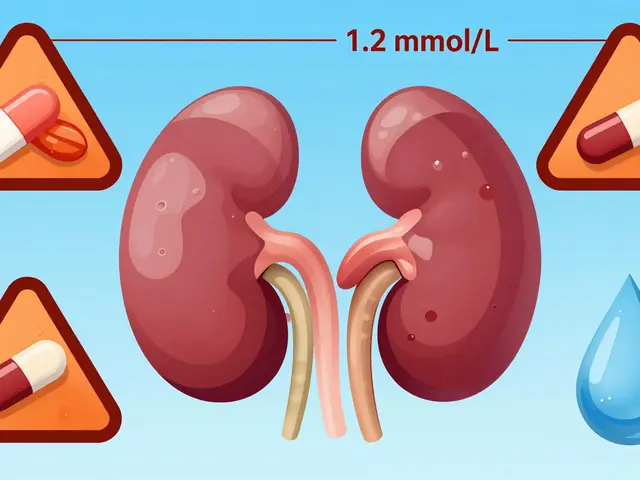Picture this: You're sitting with someone you care about, sipping tea, and suddenly the conversation hits a brick wall. Not because there's nothing left to say, but because memories don't come quite as easily anymore. The frustration, the quiet sadness—it sticks around. If you've ever seen someone wrestle with memory loss, you know how much every little improvement matters. Reminyl, also known by its generic name galantamine, is one of those rare names that pops up a lot in these conversations, especially when Alzheimer's comes into play.
What Is Reminyl and How Does It Work?
Reminyl is a brand name for galantamine, a medicine that’s been used to help people with mild to moderate Alzheimer’s disease. Not many folks know this, but the active ingredient galantamine originally came from the bulbs of snowdrops—a simple white flower you’d probably ignore on a morning walk. These days, galantamine’s usually made in labs, but its purpose is the same: to give the brain a little extra help with memory and thinking problems.
The main problem in Alzheimer's is nerve cells struggling to communicate. In the simplest terms, the brain depends on a chemical called acetylcholine to shuffle messages from cell to cell. In dementia, especially Alzheimer's, those messages don’t get through as well. What Reminyl does is stop this chemical from breaking down too quickly, making sure those signals hang around longer than they normally would. There’s science backing this up—studies consistently show galantamine keeps acetylcholine levels higher for longer, helping people remember names, keep up with conversations, and stay more independent.
Scientists noticed that older brains start losing their knack for making acetylcholine, which explains why memory, learning, and even mood take a hit. Reminyl also has another trick: It messes with something called nicotinic receptors, priming them to release more acetylcholine. So, this dual action means it doesn’t just save the existing brain power, it squeezes a bit more out too.
What Does Reminyl Treat, and Who Gets It?
Reminyl is squarely aimed at people with Alzheimer’s and, occasionally, some other types of dementia. It's not given to just anyone who’s forgetful—losing keys isn't a ticket to galantamine. Doctors look for patterns: consistent memory lapses, problems making decisions, trouble navigating familiar places. Official guidelines in Australia (and most of the Western world) say it’s mainly for ‘mild to moderate’ cases, not the severe end where brain cells have gone too far down the road.
People as young as 50 and as old as 95 get prescribed Reminyl, though it’s usually folks in their 60s and 70s. It’s not a cure—it doesn’t stop the march of Alzheimer’s—but it can ease symptoms for a while and make daily life a touch smoother. If a family member starts struggling with recalling words, gets confused at supermarkets, or can’t follow TV plots anymore, this medicine sometimes slows the decline enough to give everyone a breather.
Doctors pay attention to details: How bad are memory gaps? What other illnesses does someone have? Are they taking heaps of medications already? It’s not just about memory, either—Reminyl sometimes helps with things like aggression, wandering, and constant repetition that sap a family’s energy. You’d be surprised how much it can give caregivers a sense of hope, or at least help them get through the week with fewer crises.

Real-World Effects: Does Reminyl Help Alzheimer's Symptoms?
Here’s where things get interesting. Not every medication lives up to its marketing, but Reminyl’s got hard data behind it. Clinical trials with thousands of people show that, over about six months, memory improves modestly in about a third of patients. It’s not a miracle fix, but for the right person, it means remembering loved ones’ names or managing their own finances a little longer.
A typical improvement is measured by something called the MMSE (Mini-Mental State Examination). On average, folks taking Reminyl score a couple of points higher than those who don’t, even after six or twelve months. That gap matters—a few small wins can add up, especially when you’re hanging onto independence. Here’s a quick peek at some numbers from published studies:
| Effect | Reminyl Group | Placebo Group |
|---|---|---|
| MMSE Score Change (6 months) | +1.5 | -1.0 |
| Daily Living Skills Improvement | 33% | 13% |
| Behavioral Symptoms Relief | 27% | 11% |
People often notice better attention spans, less agitation, and more success with daily routines—basic stuff like making a cuppa or taking a shower unprompted. No, it won’t stop Alzheimer’s, and not everyone gets these benefits, but often families see just enough change to feel the medication is pulling its weight.
Sticking with Reminyl for at least 3-6 months is key. Most doctors in Sydney and across Australia schedule regular check-ins and ask both the person taking it and a close family member how things are going. If there’s no change after some months, or if side effects get annoying, they usually call it quits.
Reminyl Dosage, Side Effects, and Safety Tips
The starting dose in Australia is usually 4mg twice a day. Doctors gently ramp it up to 8mg or even 12mg twice a day after a few weeks—no racing ahead, because sudden jumps bring nasty side effects. If your loved one’s been prescribed it, timing matters: taking Reminyl with food cuts down on stomach problems like nausea or vomiting.
The most common side effects? Upset stomach, diarrhea, headaches, and sometimes feeling faint. Elderly people can get dehydrated quickly with these, so always keep an eye on water intake, especially during Sydney’s hotter months. Some folks also feel more tired or get dizzy, which is a worry with fall-prone older adults. On the bright side, most symptoms fade in a week or two as the body gets used to the medicine.
Liver or kidney issues can change how safe Reminyl is, so there’s extra caution there. It’s also not a great match with certain other medicines—especially other memory drugs, some antidepressants, and anticholinergics used for allergies or incontinence. Always chat with the pharmacist and make sure the full medication list is up to date. Never double up missed doses or change timing on your own—side effects can jump out of nowhere.
For anyone starting Reminyl, these hints make life easier:
- Take with meals to reduce nausea.
- Use weekly pillboxes—memory lapses can mess up medication routines, and a simple plastic box can be a game-changer.
- Keep regular doctor appointments for check-ins—spotting a drop in effectiveness is super important.
- If sleep becomes patchy, ask your GP about adjusting dose timing.
- Report any sudden mood changes—you know your person best, and sometimes drugs act differently in each person.

Life With Reminyl: Practical Tips and What Family Members Should Watch Out For
Caregiving is a marathon, not a sprint. If someone in your life has started Reminyl, a few small tweaks in the daily routine can really boost its benefits. First, put the medicine schedule near something regular—a breakfast table or beside the kettle. Pairing it with food takes the sting out and sets up a healthy breakfast habit too. Don’t underestimate the power of reminders: digital alarms, sticky notes, or even asking Alexa can keep things on track.
Because Alzheimer’s and other dementias bounce around day to day, write down any big changes in memory, mood, or energy in a notebook or your phone. Bring it to GP or specialist appointments; doctors love these real-life details more than any online checklist. If you notice better moods or fewer embarrassing public mix-ups, those are wins. But if side effects stick around past the first fortnight, or hydration seems off—watch for peeing less, dry lips, confusion—reach out fast. Dehydration is sneaky and serious, especially with added summer heat or existing medical trouble.
Families should sync up: share updates and lookout for signs of improvement (or trouble). A WhatsApp group or regular phone call can make all the difference, especially if several people are pitching in from different suburbs or even states. One person shouldn’t carry the whole load—Alzheimer’s touches everyone around it.
Above all, remember that Reminyl doesn’t turn back time, but it sometimes lets people hang onto their stories, preferences, and routines for a little longer. It won’t erase the stress of dementia, but you’ll probably see flashes of the person you recognise more often—that’s what most families say once the dust settles with the new medication. And that, just for a while, is worth the effort.







Mark French
August 2, 2025 AT 02:42